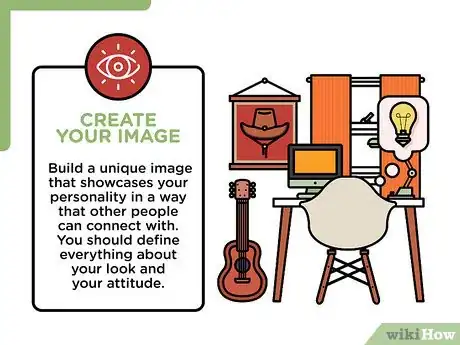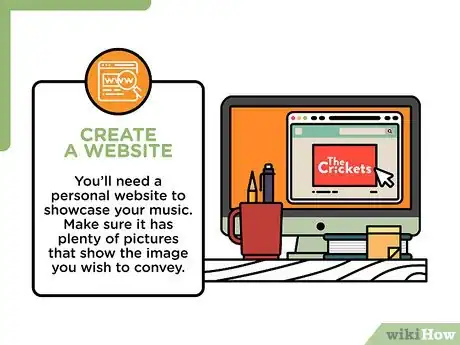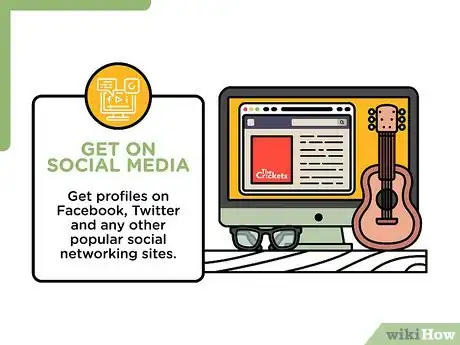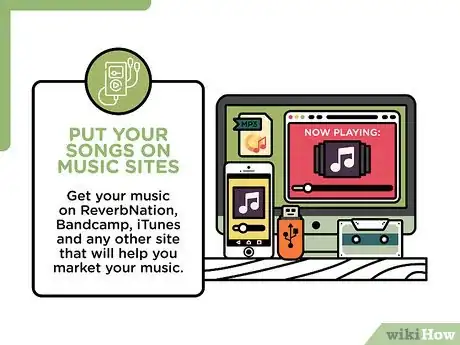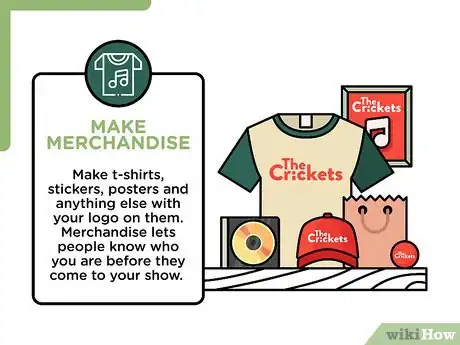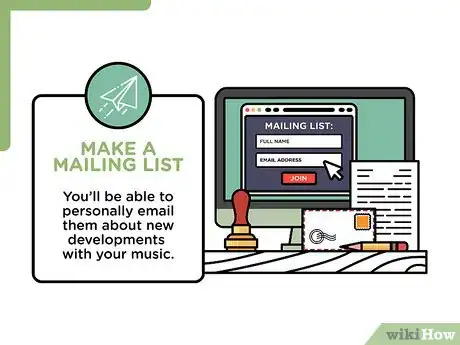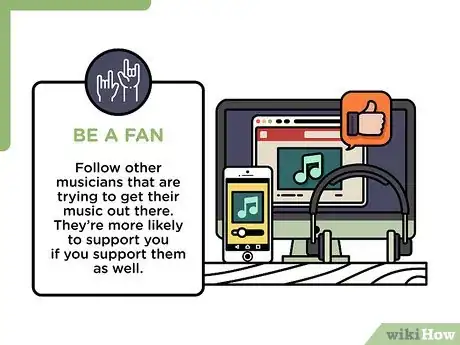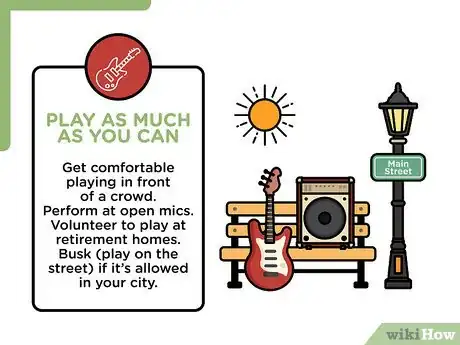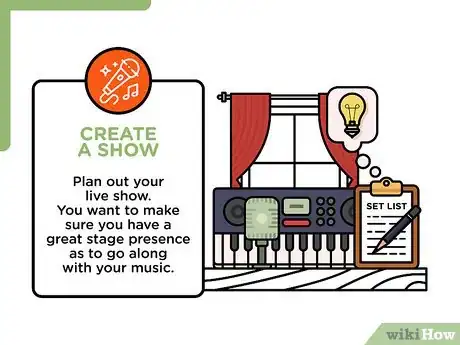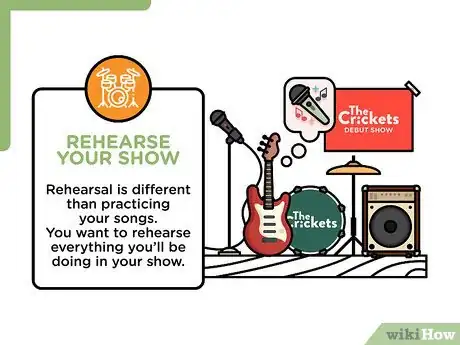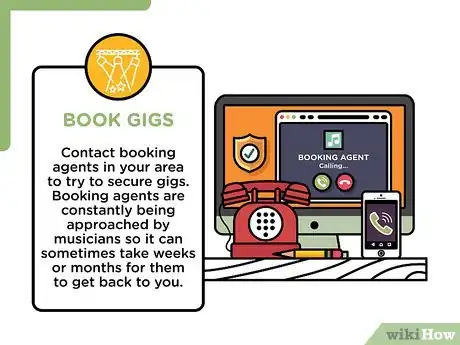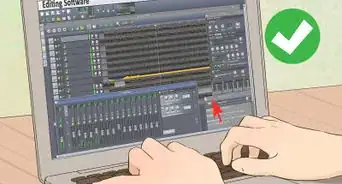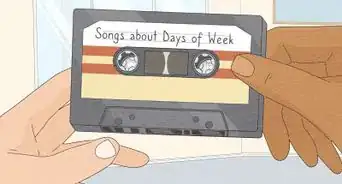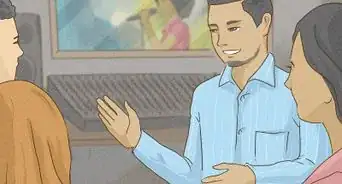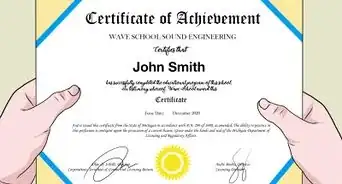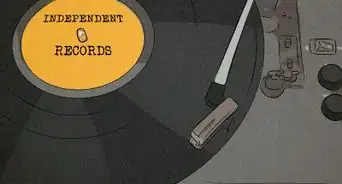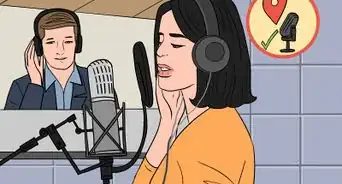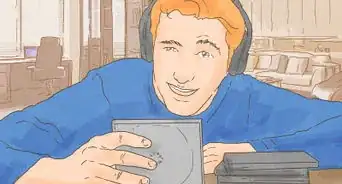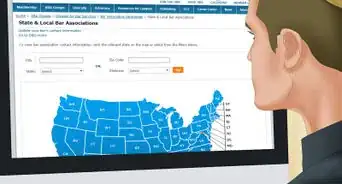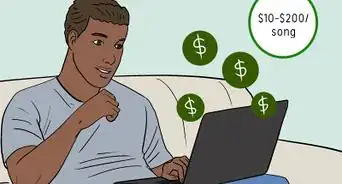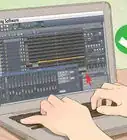This article was co-authored by Timothy Linetsky. Timothy Linetsky is a DJ, producer, and music educator that has been making music for over 15 years. He is a certified Ableton trainer and creates educational YouTube videos focused on producing electronic music. He has over 90,000 YouTube subscribers.
This article has been viewed 124,607 times.
If you are an aspiring musical artist, the first step to success is to have your music heard! Luckily, there are a few easy steps to get your songs out there. If you want your music to be heard, you need a strategy to reach your desired audience.
Steps
Marketing your Music
-
1Create your image. Build a unique image that showcases your personality in a way that other people can connect with. Most rock stars have a slew of defining qualities that are specific to them. For example, Mick Jagger always wears tight, flashy clothes, sticks out his chest and explodes with energy to show he’s rebellious and doesn’t care what anyone thinks about him. You should define everything about your look and your attitude.[1]
- Stay up to date with trends. You don’t have to follow them, but you should at least know what you’re choosing not to participate in.
- Magnify your strengths. Find out what people like about you and and highlight it.
-
2Record a demo. Your demo will be your calling card. You’ll give it out at shows and venues so people will remember you. Make sure it’s professional quality. If your demo isn’t good quality, people will think you’re an amateur.[2]
- Make a rough recording on your own to make sure everything sounds the way you want it to. You don’t want to waste expensive studio time tinkering with your song.
- Practice your songs with a metronome and record them to a click track to stay on rhythm. This will allow you to seamlessly add backup instruments to your demo.
- Keep it short. The people you’ll be giving your demo to are likely very busy. Your demo should be five songs or under.
- Put your best song first. Hook your listener right away.
- Make sure your demo has a cover that reflects your personality.
EXPERT TIPTimothy Linetsky is a DJ, producer, and music educator that has been making music for over 15 years. He is a certified Ableton trainer and creates educational YouTube videos focused on producing electronic music. He has over 90,000 YouTube subscribers.Music Producer & Instructor
 Timothy Linetsky
Timothy Linetsky
Music Producer & InstructorMake music that's true to your own sound. Timmy Linetsky, also known as DJ Underbelly, tells us: "Unless your goal is to make really commercial stuff, I wouldn't worry about the marketability of your music at first. The beauty of the internet is that there’s now an audience for everything. Marketability often is a creative hinderance more than anything else. It’s not something to worry about until the project is — from a creative standpoint — 100% done."
Advertisement -
3Create a website. You’ll need a personal website to showcase your music. Make sure it has plenty of pictures that show the image you wish to convey. Make sure your website looks professional. Your website should also have:
- A way for fans to download your music
- Performance dates where your fans can see you
- Videos of live performances if you have them
- A bio
- Contact information for people who want to hire you
-
4Get on social media. Get profiles on Facebook, Twitter and any other popular social networking sites. Use these profiles to showcase your personality and let people know what's going on with your music.
-
5Put your songs on music sites. Get your music on ReverbNation, Bandcamp, iTunes and any other site that will help you market your music. These sites are great places to get discovered by other musicians.
- Bandcamp even offers ways for fans to support your music with financial donations.
- ReverbNation offers inexpensive promotion for your music so more people can hear it.
-
6Make merchandise. Make t-shirts, stickers, posters and anything else with your logo on them. When someone wears or uses your merchandise, they’re promoting you. You want as many people to see your image as possible.
- Merchandise lets people know who you are before they come to your show. They’ll want to see why other people like you.
-
7Make a mailing list. Whenever you play a show, encourage people to sign up for your mailing list. You’ll be able to personally email them about new developments with your music. Let them know when:
- You have a show
- You have new music coming out
- You have a collaboration with other musicians
-
8Be a fan. Follow other musicians that are trying to get their music out there. They’re more likely to support you if you support them as well. Download their music. Use their merchandise. Go to their shows. Do whatever you can to help other musicians succeed.
Playing Live
-
1Play as much as you can. Get comfortable playing in front of a crowd. You’ll likely have to play a lot of non-paying gigs before you can land any playing ones.
- Perform at open mics.
- Volunteer to play at retirement homes.
- Busk (play on the street) if it’s allowed in your city.
-
2Create a show. Plan out your live show. You want to make sure you have a great stage presence as to go along with your music. Find out what you can do to make your show more engaging.[3]
- Add personal stories to go along with your songs.
- Tell jokes.
- Learn dance moves that will help your audience get into the music.
- Have a light show to go with your music.
-
3Rehearse your show. Rehearsal is different than practicing your songs. You want to rehearse everything you’ll be doing in your show. Make your performance tight. Practice engaging with the audience.
-
4Book gigs. Contact booking agents in your area to try to secure gigs. Give them your demo and a link to your website so can hear your music and decide whether it fits their venue. Booking agents are constantly being approached by musicians so it can sometimes take weeks or months for them to get back to you. Remind them politely by email periodically that you’d still like to play at their venue.[4]
- Be honest about your draw. Don’t say you can bring in more audience than you’re sure you can.
- When you do book a gig, always be on time and be respectful of the crew.
-
5Meet people. Try to talk to people who enjoy your show to make new fans. Show them where they can go to find your music. Have them join your mailing list. You may even meet people who have skills and can help you further your career. Getting your music heard is all about connecting with people who want to support you.
- Be organized. Have a list of the people in the music industry you meet and what they do.
- Stay in touch. Maintain relationships with the people you meet in the industry. They’re more likely to help you spread your music if they feel like you like them.
Community Q&A
-
QuestionIs it advisable to register my music before doing any of this?
 Community AnswerWhen you create your music (meaning it is recorded or put on paper for the first time), it is automatically copyrighted. That being said, it's recommend that you register your copyright. That will effectively prevent other people from stealing your music.
Community AnswerWhen you create your music (meaning it is recorded or put on paper for the first time), it is automatically copyrighted. That being said, it's recommend that you register your copyright. That will effectively prevent other people from stealing your music. -
QuestionHow do I contact singers as a writer and composer?
 Community AnswerStart off asking people you know, it's much easier to get connected with singers through personal connections. I am doing this now as I'm writing music. I talk to some friends, learn who they know that sings, and then go directly to them whether it is through social media or in person.
Community AnswerStart off asking people you know, it's much easier to get connected with singers through personal connections. I am doing this now as I'm writing music. I talk to some friends, learn who they know that sings, and then go directly to them whether it is through social media or in person. -
QuestionWhat do I do if I sing, and people call me terrible?
 Simon LafuaCommunity AnswerThat means you have a unique voice. Don't give up. You'd be surprised to hear how amazing that same voice sounds after lots of dedicated practice.
Simon LafuaCommunity AnswerThat means you have a unique voice. Don't give up. You'd be surprised to hear how amazing that same voice sounds after lots of dedicated practice.
Warnings
- Getting your music heard can be very expensive between recording, promoting and maintaining websites.⧼thumbs_response⧽
- Adjust your strategy. If your music isn't being heard, you may need to redesign your website or write different songs. Always analyze whats working and what isn't.⧼thumbs_response⧽
References
About This Article
To get your songs heard, record a short demo to give potential clients. Make sure your demo doesn't have more than 5 songs, and lead with your best song in order to hook the listener. Once you have a demo, create a website to showcase your music, and list any performance dates and contact information visibly. Then when you're ready, start playing publicly! Try playing in front of a crowd at a variety of places, including open mics and retirement homes, in order to get your music heard as much as possible. For more tips, like on booking gigs, scroll down!
